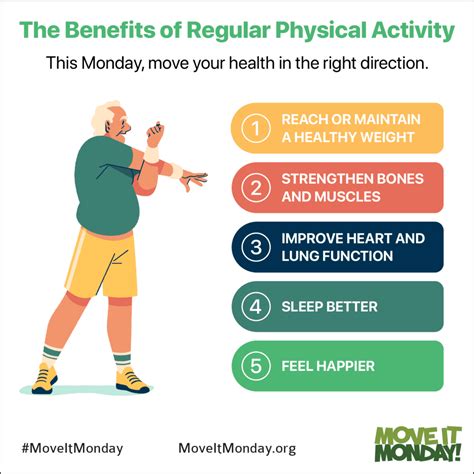In today's fast-paced and sedentary world, taking care of our physical and mental health has become more crucial than ever before. Engaging in regular physical activity comes with a myriad of benefits that go beyond just staying fit and maintaining a healthy weight. It is a powerful tool that can enhance your overall well-being, both physically and mentally.
First and foremost, incorporating regular exercise into your lifestyle can significantly improve your physical strength and endurance. Whether you prefer cardiovascular activities like jogging or swimming, or strength training exercises like weightlifting or Pilates, engaging in these activities consistently can help you build stronger muscles, increase bone density, and enhance your overall physical performance.
Moreover, regular physical activity has been proven to have a positive impact on our mental health as well. Exercise is known to release endorphins, which are natural mood boosters that can alleviate symptoms of stress, anxiety, and depression. By engaging in physical activities, you give your mind a break from daily worries, allowing yourself to feel more relaxed, focused, and emotionally stable.
Additionally, incorporating regular exercise into your routine can improve your sleep patterns. Studies have shown that engaging in physical activities can help regulate your sleep cycle, making it easier for you to fall asleep and stay asleep throughout the night. Getting an adequate amount of restful sleep, in turn, boosts your energy levels, enhances your cognitive abilities, and promotes better mental clarity.
Furthermore, regular exercise is closely linked to improved cognitive function and memory retention. Physical activities stimulate the release of chemicals in the brain that promote the growth of new brain cells and improve the connections between existing ones. This leads to sharper cognitive abilities, better concentration, and enhanced memory formation and retention.
Ultimately, incorporating regular physical activity into your lifestyle is key to achieving optimal overall well-being. It not only enhances your physical strength and endurance, but also has a profound positive impact on your mental health, sleep patterns, and cognitive abilities. So, make it a priority to engage in activities that you enjoy and that challenge your body and mind. The numerous benefits that regular exercise brings will undoubtedly contribute to a healthier, happier, and more fulfilling life.
Improved cardiovascular wellbeing

Enhanced heart health is one of the numerous advantages of engaging in regular physical activity. By engaging in activities that raise your heart rate and make you breathe harder, you can enhance the function of your cardiovascular system. This can result in a decreased risk of various heart-related illnesses, such as heart disease, high blood pressure, and stroke.
Engaging in regular exercise helps to strengthen the heart muscle, making it more efficient at pumping blood throughout the body. This increased efficiency reduces the strain on the heart and lowers the risk of cardiovascular conditions. Additionally, regular exercise has been shown to improve blood circulation, which can enhance the delivery of oxygen and nutrients to the body's organs and tissues.
Not only does exercise benefit the heart itself, but it also positively affects other factors that contribute to cardiovascular health. Regular physical activity can help to manage weight, lower cholesterol levels, and regulate blood sugar levels, all of which are crucial for maintaining a healthy heart.
Furthermore, engaging in regular exercise can improve the elasticity and strength of blood vessels, reducing the risk of plaque buildup and blockages. This can help to prevent conditions such as atherosclerosis and coronary artery disease, which can lead to heart attacks and other cardiovascular events.
Incorporating aerobic activities, such as brisk walking, swimming, or cycling, into your daily routine can have significant cardiovascular benefits. Aim for at least 150 minutes of moderate-intensity aerobic exercise per week, or 75 minutes of vigorous-intensity exercise, to reap the rewards for your cardiovascular health.
Improved Strength and Endurance: Building a Stronger Body
Increase your physical power and ability to perform daily activities with improved muscle strength and endurance. Strengthening your muscles not only enhances your physical appearance, but also supports your overall well-being. Regular exercise empowers you to push boundaries, exceed limitations, and build a resilient body that can withstand the challenges of everyday life.
Enhanced Muscle Strength: Through consistent exercise, your muscles adapt and grow stronger. Resistance training, such as lifting weights or using resistance bands, stimulates the muscles to work harder and develop increased strength. With enhanced muscle strength, you can tackle physical tasks with greater ease and efficiency.
Increased Muscular Endurance: Regular exercise also improves muscular endurance, allowing you to sustain physical activity for longer durations without experiencing fatigue. This increased endurance can be particularly beneficial during activities that require repetitive motions, such as running, cycling, or swimming. By gradually increasing the intensity and duration of your workouts, you can train your muscles to endure prolonged periods of exertion.
Improved Overall Performance: By focusing on increasing your muscle strength and endurance, you are taking important steps towards improving your overall physical performance. Whether you are an athlete aiming to enhance your competitiveness or simply looking to improve your daily performance, regular exercise can help you achieve your goals. By investing time and effort into building a stronger body, you can unlock your potential and experience a higher level of physical competence.
Reduced Risk of Injury: Strengthening your muscles not only enhances physical performance, but also helps to protect against injuries. Strong muscles provide better support and stability for your joints, reducing the risk of sprains, strains, and other injuries. Additionally, improved muscular endurance decreases the likelihood of muscle fatigue, which can lead to accidents or mishaps during physical activities.
To summarize, incorporating regular exercise into your routine can result in improved muscle strength and endurance. This boost in physical power and resilience allows you to perform daily tasks more efficiently and reduces the risk of injury. Investing in your body's strength and endurance sets the foundation for overall physical performance and contributes to your overall well-being.
Managing Weight and Achieving a Healthy Body Composition

When it comes to maintaining a balanced and fit physique, the role of regular physical activity cannot be overstated. Engaging in various forms of exercise not only contributes to weight management but also helps achieve a healthy body composition.
Body weight management: Participating in regular physical activity aids in controlling body weight by burning calories, which can prevent weight gain and promote weight loss. Additionally, exercise helps maintain a healthy body mass index (BMI), preventing the development of obesity and related health conditions.
Improving body composition: Regular exercise promotes the development of lean muscle mass while reducing body fat percentage, resulting in improved body composition. This can enhance overall physical appearance and increase metabolic rate, leading to more efficient energy expenditure.
Enhancing metabolism: Physical activity stimulates metabolic processes, increasing the rate at which the body utilizes calories. This boost in metabolism not only aids in weight management but also contributes to overall well-being and energy levels.
Reducing the risk of chronic diseases: Maintaining a healthy body composition through exercise can reduce the risk of various chronic diseases, such as cardiovascular disease, type 2 diabetes, and certain cancers. Additionally, regular physical activity helps regulate blood sugar levels and blood pressure, improving overall health.
Boosting self-esteem: Achieving and maintaining a healthy body composition can significantly enhance self-esteem and body image. Regular exercise releases endorphins, boosting mood and promoting a positive body image, leading to improved mental well-being.
Increasing overall strength and flexibility: Engaging in exercises that promote weight management and healthy body composition also strengthens muscles and improves flexibility. This allows for better performance in daily activities, reduces the risk of injuries, and supports proper posture.
Improving sleep quality: Regular physical activity can help regulate sleep patterns and improve sleep quality. Achieving a healthy body composition through exercise promotes relaxation and reduces stress, leading to more restorative sleep.
Maintaining a healthy lifestyle: Consistently incorporating exercise into one's routine promotes a healthy lifestyle overall. It encourages individuals to make better dietary choices, engage in other physical activities, and prioritize their overall well-being.
By emphasizing weight management and achieving a healthy body composition, regular exercise proves to be instrumental in promoting physical and mental health, preventing chronic diseases, and enhancing overall well-being.
Improved Emotional Well-being through Elevated Mood and Alleviated Symptoms of Depression and Anxiety
Exercise has the power to positively impact our emotional well-being by elevating our mood and reducing symptoms of depression and anxiety. Engaging in physical activity regularly can lead to a more positive outlook on life, heightened self-esteem, and improved emotional resilience. Additionally, exercise has been found to alleviate the burden of depression and anxiety, providing individuals with a natural and effective means to manage these mental health conditions.
Research has consistently demonstrated a correlation between exercise and elevated mood. When we engage in physical activity, our bodies release endorphins, also known as "feel-good" hormones, which contribute to a sense of happiness and overall well-being. These endorphins act as natural painkillers, reduce stress levels, and enhance our ability to cope with everyday challenges.
Furthermore, regular exercise can play a significant role in reducing symptoms of depression and anxiety. Exercise has been shown to trigger the release of neurotransmitters such as serotonin and dopamine, which are responsible for regulating mood and emotions. By increasing the levels of these neurotransmitters in the brain, exercise can effectively combat feelings of sadness, hopelessness, and anxiety.
In addition to its chemical effects on the brain, exercise also provides individuals with a valuable opportunity for distraction and relaxation. Engaging in physical activity allows us to shift our focus away from negative thoughts and worries, providing a temporary respite from the pressures and stressors of daily life. It serves as a form of meditation and mindfulness, allowing us to be present in the moment and find solace in the physical sensations of movement.
| Benefits of Enhanced Mood and Reduced Symptoms of Depression and Anxiety |
|---|
| 1. Increased happiness and overall well-being |
| 2. Improved self-esteem and self-confidence |
| 3. Enhanced emotional resilience and better coping mechanisms |
| 4. Alleviation of symptoms of depression, such as sadness and hopelessness |
| 5. Reduction in anxiety levels and feelings of stress |
| 6. Enhanced release of endorphins, the body's natural mood boosters |
| 7. Increased levels of neurotransmitters responsible for regulating mood |
| 8. Distraction and relaxation from negative thoughts and worries |
In conclusion, incorporating regular exercise into our lives not only benefits our physical health but also has a profound impact on our emotional well-being. By promoting an enhanced mood and reducing symptoms of depression and anxiety, exercise provides a holistic approach to improving our overall quality of life.
Enhanced Cognitive Function and Brain Wellness

Cognitive function refers to the mental processes that allow us to think, reason, learn, and remember information. It is a fundamental aspect of our overall brain health and plays a crucial role in our daily lives. Engaging in regular physical activity not only benefits our physical and mental well-being, but also boosts our cognitive function and promotes brain health.
When we participate in regular exercise, it stimulates the release of various chemicals in our brain, such as endorphins, dopamine, and serotonin. These chemicals are known as neurotransmitters and are responsible for transmitting signals between our brain cells. By increasing the levels of these neurotransmitters, exercise helps to enhance our cognitive abilities, including attention, decision-making, and problem-solving skills.
In addition to improving neurotransmitter levels, physical activity also increases the production of brain-derived neurotrophic factor (BDNF). BDNF is a protein that supports the growth and development of neurons, the cells responsible for transmitting information in the brain. By promoting the growth of new neurons and strengthening existing neural connections, exercise aids in maintaining optimal brain function and preventing age-related cognitive decline.
Furthermore, regular exercise has been associated with improved memory and learning abilities. Physical activity increases blood flow and the delivery of oxygen and nutrients to the brain, which nourishes brain cells and promotes their efficient functioning. This enhanced blood flow also promotes the formation of new blood vessels in the brain, improving its overall health and resilience.
- Boosts the release of neurotransmitters essential for cognitive function
- Increases production of brain-derived neurotrophic factor (BDNF) for neuron growth
- Enhances memory and learning abilities
- Improves blood flow, oxygen, and nutrient delivery to the brain
- Promotes the formation of new blood vessels
Incorporating regular exercise into our routines not only assists in physical fitness and mental well-being, but also provides significant benefits for our cognitive function and brain health. By engaging in activities that get our bodies moving, we can optimize our brain's performance, sharpen our cognitive skills, and improve our overall quality of life.
Reduced risk of chronic diseases like diabetes and certain cancers
Regular physical activity has been shown to have a significant impact on preventing and reducing the risk of chronic diseases such as diabetes and certain types of cancer. Engaging in exercise on a regular basis can help to maintain healthy blood sugar levels and improve insulin sensitivity, reducing the likelihood of developing diabetes.
Moreover, physical activity has been associated with a lower risk of certain types of cancer, including breast, colorectal, and lung cancer. Exercise plays a crucial role in weight management, as it can help to prevent obesity, a major risk factor for various cancers.
By incorporating regular exercise into your lifestyle, you can positively influence your overall health and well-being, reducing the risk of chronic diseases and improving your quality of life.
- Regular physical activity helps to regulate blood sugar levels and improve insulin sensitivity.
- Engaging in exercise can lower the risk of developing diabetes.
- Exercise has been associated with a reduced risk of breast, colorectal, and lung cancer.
- Maintaining a healthy weight through exercise can help to prevent obesity, a major risk factor for certain cancers.
- Incorporating regular exercise into your lifestyle can have a significant impact on your overall health and well-being.
- Physical activity plays a crucial role in reducing the likelihood of chronic diseases.
- Exercise improves the quality of life and enhances overall fitness levels.
- By prioritizing regular exercise, you can proactively reduce your risk of chronic diseases such as diabetes and certain types of cancer.
Sleep Well and Feel Energized: The Impact of Regular Physical Activity

Incorporating regular physical activity into your lifestyle can have a profound impact on your sleep quality and energy levels. Engaging in consistent exercise enables you to experience improved sleep patterns and a surge in vitality, helping you to wake up feeling refreshed and motivated to tackle the day ahead.
When you establish a routine of exercise, you are setting the stage for a better night's sleep. Regular physical activity stimulates the release of endorphins, also known as "feel-good" hormones, which can alleviate symptoms of stress and anxiety that often hinder restful sleep. By promoting a state of a calm and relaxation, exercise can help you fall asleep faster and achieve a more restorative sleep.
Moreover, incorporating physical activity into your daily routine can enhance the duration and quality of your sleep. The physical exertion during exercise increases the body's need for recovery, leading to a deeper and more profound sleep. This will allow you to wake up in the morning feeling more rejuvenated and ready to take on the challenges of the day.
Regular exercise not only benefits your sleep quality, but it also contributes to increased energy levels throughout the day. Engaging in physical activity boosts blood circulation and oxygen delivery to your muscles and organs, resulting in enhanced energy production. This increase in energy can help you combat feelings of fatigue, improve overall productivity, and keep you mentally focused and alert.
Furthermore, through regular exercise, the body becomes more efficient at transporting and utilizing oxygen, which means that activities that previously felt exhausting become easier to perform. As a result, you will experience a notable increase in stamina and endurance, allowing you to engage in daily activities with greater ease and reduced effort.
Regular physical activity also plays a crucial role in improving mental health, which in turn promotes better sleep and increased energy levels. Exercise has been shown to reduce symptoms of anxiety and depression, boost self-esteem, and enhance overall mood. By incorporating exercise into your routine, you can positively impact your mental well-being, leading to restful sleep and higher energy levels.
It is important to note that incorporating regular physical activity into your life does not require intense or excessive workouts. Engaging in activities you enjoy, such as walking, cycling, swimming, or practicing yoga, can provide significant benefits to your sleep quality and energy levels. Consistency is key, so aim for at least 30 minutes of moderate exercise most days of the week to experience the full positive impact on your sleep and energy levels.
In conclusion, integrating regular physical activity into your daily routine can greatly enhance your sleep quality and energy levels. By establishing an exercise routine, you can experience improved sleep patterns, feel more energized throughout the day, and enjoy the numerous physical and mental health benefits that come with an active lifestyle.
Strengthened Immune System and Enhanced Overall Well-being
Regular physical activity brings about a multitude of advantages that extend beyond the realm of physical and mental health. Engaging in consistent exercise helps fortify our immune system, leading to an increased ability to fend off diseases and infections. Additionally, it contributes to an overall sense of well-being, empowering us to lead healthier and more productive lives.
One of the primary benefits of an exercise routine is its positive impact on the immune system. Regular physical activity stimulates the production of antibodies and activates white blood cells, both of which play crucial roles in fighting off viruses, bacteria, and other pathogens that can threaten our health. By exercising regularly, we enhance our body's natural defense mechanisms, making us less susceptible to illnesses.
Moreover, exercise not only strengthens our physical health but also boosts our mental and emotional well-being. When we engage in physical activity, our body releases endorphins - neurotransmitters that are known to elevate mood and reduce stress levels. This not only helps us feel better overall but also reduces the risk of developing mental health issues such as anxiety and depression.
Beyond the biological benefits, regular exercise also promotes a sense of accomplishment and self-esteem. Setting and achieving exercise goals, whether it's completing a certain number of workouts per week or improving our endurance, can instill a sense of pride and confidence in our abilities. This sense of achievement carries over to other aspects of our lives, boosting our motivation and drive in various areas.
In addition to enhancing our immune system and mental well-being, exercise also contributes to improved overall well-being by enhancing our sleep quality. Regular physical activity is known to improve the duration and quality of sleep, leading to better rest and restoration. A good night's sleep is essential for proper functioning and revitalization of both our mind and body.
Furthermore, exercise fosters social connections and a sense of community. Engaging in fitness activities often involves being part of a group or team, which provides opportunities for social interaction and support. Building strong social connections contributes to our overall well-being, as it provides us with a sense of belonging, support, and motivation to maintain a healthy lifestyle.
In conclusion, incorporating regular exercise into our daily routine not only strengthens our immune system but also improves our overall well-being. By engaging in physical activity, we can enhance our body's defense mechanisms, elevate our mood, boost self-esteem, improve sleep quality, and foster social connections. These benefits collectively contribute to a healthier and happier life, enabling us to thrive both physically and mentally.
FAQ
What are the physical benefits of regular exercise?
Regular exercise has numerous physical benefits such as improving cardiovascular health, increasing muscle strength and endurance, promoting weight loss, enhancing flexibility, boosting immune function, and reducing the risk of chronic diseases like heart disease, type 2 diabetes, and certain cancers.
How does regular exercise affect mental health?
Regular exercise positively impacts mental health by reducing stress and anxiety levels, improving mood and self-esteem, promoting better sleep, increasing cognitive function and memory, and reducing the risk of mental health disorders like depression and dementia.
How often should I exercise to reap the benefits?
To enjoy the benefits of regular exercise, it is generally recommended to engage in moderate-intensity aerobic exercise for at least 150 minutes per week, along with strength training exercises two or more days a week. However, the specific exercise recommendations may vary depending on individual goals and fitness level.
Can regular exercise help with weight loss?
Yes, regular exercise can aid in weight loss by burning calories, increasing metabolism, and building lean muscle mass. However, it is important to note that exercise should be combined with a balanced diet for effective weight management.
Is it necessary to join a gym in order to exercise regularly?
No, joining a gym is not necessary to exercise regularly. There are various forms of physical activity that can be done at home or outdoors, such as walking, running, cycling, swimming, dancing, or using home workout videos or apps. The key is to find an activity you enjoy and can stick to on a consistent basis.



